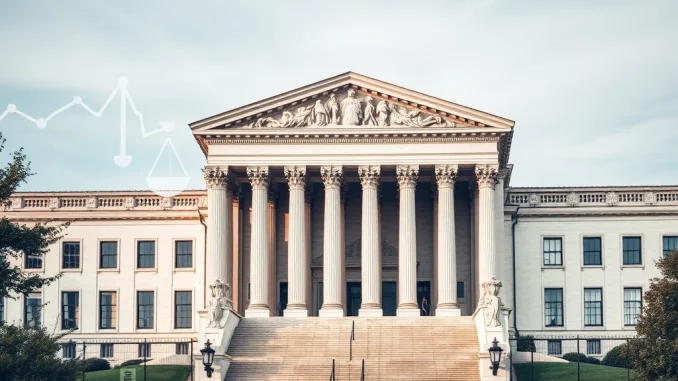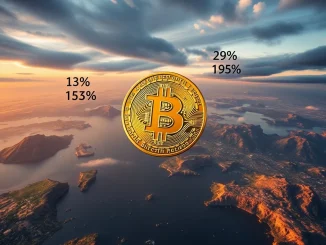
While the cryptocurrency market often focuses on on-chain metrics and specific project developments, broader macroeconomic events and policy shifts can significantly influence investor sentiment and market direction. A recent development in the legal world, though seemingly distant, touches upon these larger forces: the US District Court in Washington, D.C., has referenced a prior ruling by the International Trade Court. Understanding such legal nuances, particularly concerning trade, provides context for the economic environment that indirectly shapes asset markets, including digital assets.
What Happened with the Trade Court Ruling?
According to reports, the US District Court in Washington, D.C., recently cited a previous decision from the U.S. Court of International Trade. The specific details of the reference within the District Court’s proceedings remain undisclosed at this time. However, the earlier ruling by the U.S. Court of International Trade was notable because it involved halting a reciprocal tariff policy initiated by former President Trump.
Here is a breakdown of the key points known:
- The reference was made by the US District Court in Washington, D.C.
- The reference points back to a ruling by the U.S. Court of International Trade.
- The prior Trade Court Ruling specifically dealt with stopping a reciprocal tariff policy.
- Full details regarding the context or implications of the reference by the D.C. court are not yet public.
This development suggests ongoing legal considerations related to past trade policies, which can have ripple effects through various sectors of the economy.
Why Does a Court Ruling Washington DC Reference Matter for the Economy?
Court decisions, especially those involving trade or economic policy, can signal shifts in legal interpretations or challenges to executive actions. The U.S. Court of International Trade handles cases involving international trade and customs law. Its rulings can directly impact import and export businesses, consumer prices, and international relations. When a US District Court references such a ruling, it indicates that the principles or outcomes of that trade decision are relevant to another legal matter being considered at the federal level.
Consider the potential impacts of court rulings on trade policy:
- Business Planning: Companies relying on imports or exports need clarity on Tariff Policy. Court challenges and rulings introduce uncertainty or solidify legal frameworks, affecting business strategy, supply chains, and investment decisions.
- Consumer Costs: Tariffs are taxes on imported goods. Changes or challenges to tariffs can influence the cost of goods available to consumers.
- Market Sentiment: Legal battles over significant economic policies can affect overall market confidence. Uncertainty can lead to cautious investment, while clarity (or a favorable outcome for certain sectors) might boost sentiment.
While the direct connection to crypto is not immediate, the broader economic environment shaped by these policies and rulings certainly is. Cryptocurrencies exist within a global financial ecosystem increasingly sensitive to macro trends.
Understanding the Context of Tariff Policy Challenges
Tariffs have been a tool of economic policy for centuries, used to protect domestic industries, generate revenue, or exert pressure in international negotiations. Recent years saw increased use of tariffs as a reciprocal measure, leading to legal challenges.
The U.S. Court of International Trade has been a key venue for litigating the legality and implementation of these policies. A ruling from this court that halts a specific Tariff Policy is a significant legal check on executive authority regarding trade.
The fact that a Court Ruling Washington DC court is now referencing such a decision suggests:
- The legal precedent set by the International Trade Court ruling is relevant to other ongoing cases.
- Legal challenges to past or present trade policies continue to work their way through the federal court system.
- The interpretation and application of trade laws remain subjects of judicial review.
For market participants, monitoring these legal developments is part of tracking the regulatory and economic landscape.
Actionable Insights for Market Watchers
Given that details are scarce, specific actionable insights are limited. However, the general takeaway for those monitoring markets, including crypto, is the importance of paying attention to macro-level events:
- Stay Informed: Follow news from key economic and legal institutions, like the US District Court and the International Trade Court.
- Assess Broader Impact: Consider how rulings on trade, regulation, or other economic policies could influence overall market sentiment and liquidity.
- Diversify Information Sources: Don’t rely solely on crypto-specific news; integrate information about traditional finance, economic policy, and legal developments.
While this specific reference might not trigger immediate market moves, it is part of the larger mosaic of economic and legal factors that contribute to the market environment. The ongoing relevance of the prior Trade Court Ruling indicates that legal scrutiny of trade policy continues.
Conclusion: Monitoring the Ripple Effects of a Court Ruling
The news that the US District Court in Washington, D.C., referenced a significant Trade Court Ruling on Tariff Policy is a reminder that legal and economic forces are constantly interacting. Although the direct implications for the cryptocurrency market are indirect, such developments contribute to the overall economic climate that influences all asset classes. The prior ruling from the International Trade Court that halted a reciprocal tariff policy set a precedent that continues to be relevant in other legal contexts. As more details emerge about the D.C. court’s reference, the potential significance for ongoing trade policy discussions may become clearer. For anyone tracking markets, including the dynamic world of crypto, keeping an eye on these macro-level legal and policy developments remains a prudent approach.



